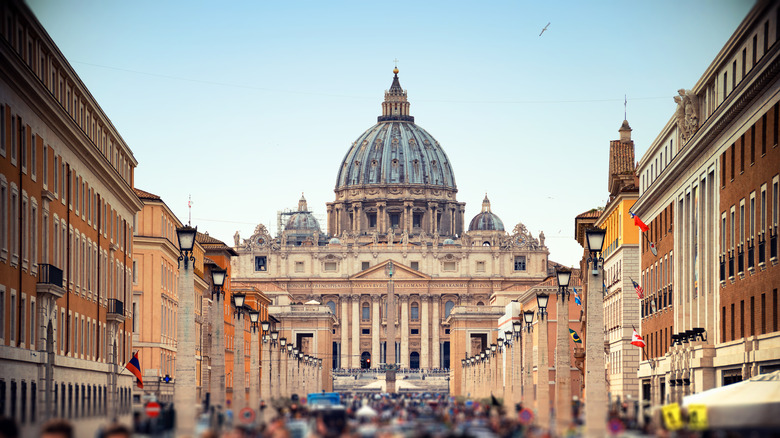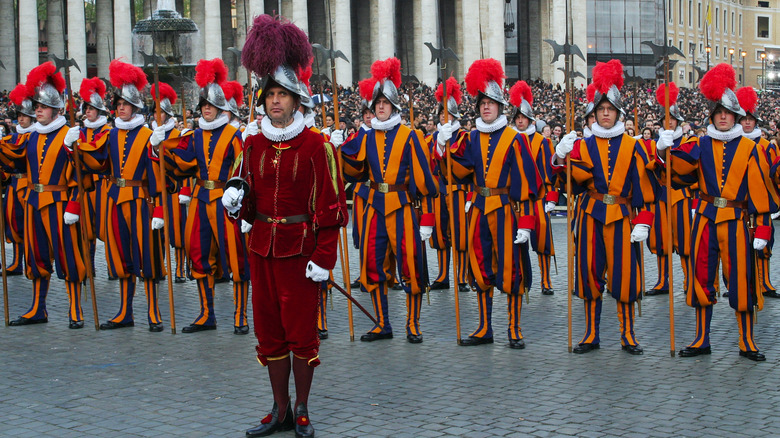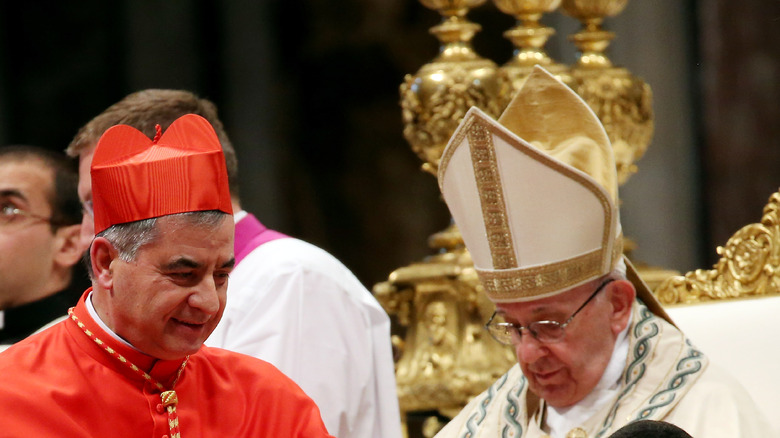The Real Reason Vatican City Has One Of The Highest Crime Rates
It's hard to imagine that the home of one of the world's most revered religious leaders, Pope Francis, is also a hotbed of criminal activity. But the crime data on this place is shocking, to say the least. In recent history, the precise number has fluctuated from 1 to 1.5 crimes per person each year. But this statistic only tells part of the story.
So how did Vatican City end up with one of the world's highest crime rates per capita? First of all, Vatican City is the smallest country, both by size and by population, on the globe (via BBC). Well, it's a bit of a numbers game. The area is home to about 1,000 people, according to a 2019 estimate (via The CIA Factbook). The vast majority of its residents are priests and nuns associated with the Catholic Church. Sounds like it should be a very safe place, but add into this equation the 18 million who travel there each year to visit such important religious sites as St. Peter's Basilica or the Sistine Chapel (via the Archdiocese of Baltimore).
The popularity of Vatican City with tourists also draws those with criminal intentions. In fact, many of the crimes there are associated with theft. The crowds in St. Peter's Square are a pickpocket's dream. Shoplifting, even among Vatican City residents, is another common offense. And out of all these reported crimes, a staggering 90% of them are never prosecuted, according to "Crime and Punishment around the World."
The wheels of justice are slow in Vatican City
Vatican City has its own distinct policing organizations and criminal justice system. A large part of its population is made up of its main military force, the Pontifical Swiss Guard Corps. The Swiss Guard mainly looks after the safety of the Pope, and its ranks are made up of Swiss Roman Catholic males between the ages of 18 to 30 who enlist in this service (via The CIA Factbook). Then there is the Gendarmerie Corps of Vatican City, a supplemental police force, which provides added security, handles traffic concerns, and conducts investigations.
According to Slate, Vatican City has only one jail and that's just used to hold prisoners before a trial. All trials are handled by judges, not juries, and its judicial branch has three levels. First, the accused appears before a trial judge, then he or she can appeal to the Tribunale (made up of three judges), and then to its Supreme Court of Appeals.
Vatican City and Italy have a special treaty on legal matters, and some cases are given over to the Italian authorities, including crimes in St. Peter's Square, according to the Archdiocese of Baltimore. Italy also handled the trial of Mehmet Ali Ağca, who tried to assassinate Pope John Paul II in 1981. Ağca also served the first part of his sentence in an Italian prison.
Pope Francis hopes to clean up corruption in the Vatican
In recent years, crime in Vatican City has stretched way beyond the purse-snatching incidents of St. Peter's Square. Serious alleged offenses by people working inside the Vatican have hit the headlines. In 2020, a former altar boy at the St. Pius X seminary in Vatican City accused another altar boy of sexually assaulting him from 2007 to 2012 (via The New York Times). The defendant later became a priest. The rector of the seminary during the time of the alleged assaults was also charged in the case for trying to cover up the crimes by lying to Vatican investigators.
Even more recently, 10 people connected to the Vatican, including a cardinal, were charged with financial crimes. The charges included money laundering, extortion, and embezzlement, according to a Reuters report. Cardinal Angelo Becciu, once a close associate of Pope Francis, was removed from his post by the Pope in September 2020 as the details of Becciu's financial misconduct surfaced (via BBC). Becciu allegedly used $412 million of church funds to buy property in London, and he also put the church's money into businesses connected to his brothers.
Pope Francis seems to be committed to rooting out corruption in the Vatican. In April 2021, he made changes to the church rules to enable the prosecution of cardinals and bishops by the Vatican City secular criminal tribunal, according to the Associated Press. Before this change, cardinals and bishops were judged by an appeals court made up of three cardinals.


